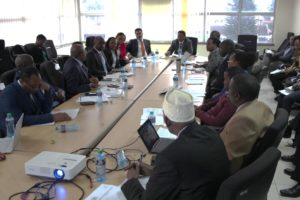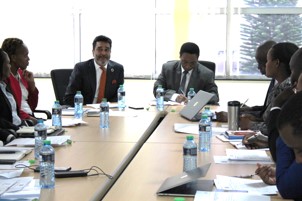Ninth Ministerial Stakeholder Forum
The Ministry of Health (MOH) held the ninth ministerial stakeholders forum on 23rd October 2018 at the MOH, Afya Annex building. The meeting was chaired by Dr. Jackson Kioko, Director of Medical Services (DMS) and co-chaired by Dr. Amit Thakker, chairman, Kenya Healthcare Federation (KHF). This forum brought together different health stakeholders including Christian Health Associations of Kenya (CHAK), Nursing Council of Kenya, Kenya Medical Practitioners and Dentist Board (KMPDB) and Kenya Private Sector Alliance (KEPSA), to discuss emerging issues in the private health sector, the progress made since the eighth MSF, and the way forward.
n his opening remarks, Dr. Kioko thanked the private health sector team led by their chairman Dr. Thakker for their great efforts in advocacy and strengthening the partnership between the private sector and MOH. The DMS noted that MOH and the counties may not be able to provide 100% of the services therefore are very grateful for the contribution of the private sector. “Both public and private health sector should ensure that quality is at the core of delivering health services. We also need to train the health workers in having a good mind set, right attitude and good etiquette”, said Dr.Kioko. He further added that the human resource norms and standards need to be reviewed because they do not reflect the reality on the ground.
Dr. Thakker in his opening remarks thanked all the attendees for making the time to attend the forum and discuss Kenya’s health agenda. He emphasized that public – private dialogue is a two way engagement and PPP cannot be left to one party alone. Dr. Thakker assured indicated that KHF’s presentation on the role of the private sector will be shared with MOH ahead of Presidential Round Table (PRT). In the previous MSF, there were major issues that were discussed with much progress made including: Health Regulations – control of the cost of healthcare – it was agreed that implementation of the Health ACT 2017, including the Kenya health professional oversight authority will contribute towards control of healthcare costs; Regulation of doctor’s charges – it was suggested that a strong taskforce be formed to assess the doctors fees and procedures e.g. diagnostics, scans, medications, laboratory e.t.c. and give a report that will inform the regulation of the same.
It was agreed in the previous MSF meeting that KHF should be involved in the process of making Kenya quality model for health (KQMH) the minimum standards certifying tool in Kenya. Ms. Faith Muigai, regional director- Pharm Access foundation informed the attendees that AMREF has been an implementing partner and will share an official report soonest. Dr. Kioko reiterated that quality and standards is a vital area to focus on for UHC. “When it comes to matters of quality and standards, we are looking at collaborations”, said Dr. Kioko. Dr. Thakker suggested that the assessment starts with the areas providing low quality, then progress to areas providing high quality. KMPDB announced a joint inspection of health facilities, and requested KHF to send representatives to join the inspection team and give their input, to which KHF obliged.
Healthcare financing is very key in achieving UHC and the private sector is a major contributing partner. Dr.Kioko requested the private sector to present a well structured action plan on the role of the private sector. Dr.Thakker informed the DMS that the role of the private sector has not been clearly defined particularly in healthcare financing, because the role of NHIF vis-a-vis private health insurance is unclear. Dr.Thakker reported that KHF has visited seven counties to assess their healthcare financing needs and existing models. “The urgency of the counties is now. They have already modelled their own schemes and the big question is where does MOH see the role of the county schemes fitting. It is important that a risk pooling structure be clearly defined so that the private sector can engage”, added Dr. Thakker.

Dr. Kioko responded by saying that MOH is supporting the county financing schemes. “Although issues of sustainability and acceptability of the county medical schemes have been raised, we need to look at them positively and allow them to continue, as we look into how we can support them to be more cost effective” Dr. Kioko added. He further explained that the choice of pilot counties for UHC roll out was based on the need to cover the vulnerable first then the less vulnerable, and that the pilot will be a learning phase which will be monitored to determine which partners need to be brought on board.
Commenting on county managed schemes, Mr. Elkana Onguti of MOH however cautioned that too may pools end up in excessive administrative spend. Dr. Thakker then suggested to MOH to implement a regulatory authority that will regulate the schemes.
In matters of supply chain, KHF requested that regulations for appropriate control of parallel imports should be implemented. Dr. Siyoi, CEO, Pharmacy and Poisons Board (PPB) reported that regulations have indeed been drafted and are due to be gazetted in a few days. Ms. Faith Muigai, regional Director, Pharm Access Foundation emphasized that when looking at strengthening quality and standards, supply chain should also be strengthened. Mr. Onguti, reported that a legal framework has identified some gaps in supply chain though the discussions have not been finalized.
On price control of medicines, Dr. Siyoi reported that a task force has been formed that is looking at price reduction strategies, and he will give a report on this once the task force completes their report. The issue of coding of medicines was raised by Dr. Peter Kamunyo, CEO, Medsource Group. Dr.Kioko invited KHF to prepare and present a proposal to MOH on coding. Dr. Daniella Munene, CEO, Pharmaceutical Society of Kenya (PSK), suggested that Kenya should select the global language of ATC codes as used by PPB to register medicines. Dr. Munene will work closely with PPB on this, to propose a workable coding system for medicines.
